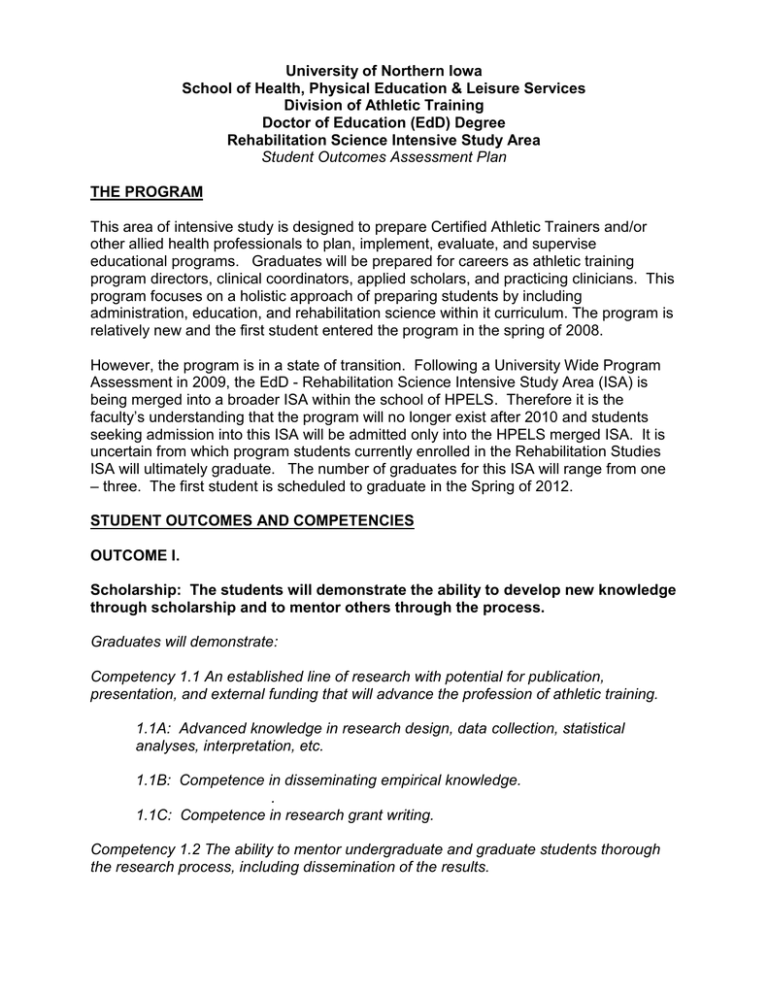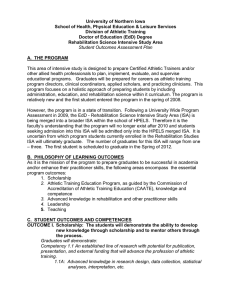University of Northern Iowa Division of Athletic Training
advertisement

University of Northern Iowa School of Health, Physical Education & Leisure Services Division of Athletic Training Doctor of Education (EdD) Degree Rehabilitation Science Intensive Study Area Student Outcomes Assessment Plan THE PROGRAM This area of intensive study is designed to prepare Certified Athletic Trainers and/or other allied health professionals to plan, implement, evaluate, and supervise educational programs. Graduates will be prepared for careers as athletic training program directors, clinical coordinators, applied scholars, and practicing clinicians. This program focuses on a holistic approach of preparing students by including administration, education, and rehabilitation science within it curriculum. The program is relatively new and the first student entered the program in the spring of 2008. However, the program is in a state of transition. Following a University Wide Program Assessment in 2009, the EdD - Rehabilitation Science Intensive Study Area (ISA) is being merged into a broader ISA within the school of HPELS. Therefore it is the faculty’s understanding that the program will no longer exist after 2010 and students seeking admission into this ISA will be admitted only into the HPELS merged ISA. It is uncertain from which program students currently enrolled in the Rehabilitation Studies ISA will ultimately graduate. The number of graduates for this ISA will range from one – three. The first student is scheduled to graduate in the Spring of 2012. STUDENT OUTCOMES AND COMPETENCIES OUTCOME I. Scholarship: The students will demonstrate the ability to develop new knowledge through scholarship and to mentor others through the process. Graduates will demonstrate: Competency 1.1 An established line of research with potential for publication, presentation, and external funding that will advance the profession of athletic training. 1.1A: Advanced knowledge in research design, data collection, statistical analyses, interpretation, etc. 1.1B: Competence in disseminating empirical knowledge. . 1.1C: Competence in research grant writing. Competency 1.2 The ability to mentor undergraduate and graduate students thorough the research process, including dissemination of the results. 1.2A: The ability to teach and guide other students in research design, data collection, statistical analyses, interpretation, etc. 1.2B: Competence in mentoring students in disseminating empirical knowledge. OUTCOME II. Program Administration: The students will demonstrate knowledge and competence in the CAATE standards that guide Athletic Training Education Programs. Graduates will demonstrate: Competency 2.1 The ability to interpret and organize the required teaching content listed in the current competency and proficiency matrix established for entry-level programs. 2.1A: The ability to organize and assign specific content to specific courses within a CAATE approved program. 2.1B: The ability to complete the self-study process as mandated by CAATE. OUTCOME III. Advanced Knowledge: The students will demonstrate advanced knowledge in rehabilitation and other professional skills. Graduates will demonstrate: Competency 3.1 The ability to critique, analyze, and interpret current literature of rehabilitation and related topics specific to theory and evidence based practice. 3.1A: Successful completion of the program coursework 3.1B. Submission of current concepts in rehabilitation and other professional skills for publication in professional journals or through presentation at professional symposia. . OUTCOME IV. Leadership: The students will demonstrate advanced leadership skills in preparation for advanced career opportunities within the athletic training profession. Graduates will demonstrate: Competency 4.1 The ability to lead on multiple levels. 4.1A: Successful student advising. 4.1B. Successful event coordination and planning involving a professional symposia. 4.1C Successful implementation of an academic related process within an academic division (curricular change, course restructuring, program restructuring, field experience restructuring, etc). OUTCOME V. Teaching: The students will demonstrate the ability to develop and deliver both undergraduate and graduate content. Graduates will demonstrate: Competency 5.1 The ability to develop undergraduate and graduate course content. 5.1A: Successful preparation of course syllabi. 5.1B. Successful methods of assessing students course outcomes. 5.1C Competence in developing course content structured with a CAATE approved curriculum. Competency 5.2 The ability to deliver graduate and undergraduate content and instruct. 5.2A: Successful delivery of course material. 5.1B. Successful adaption of instructional methods based upon student feedback and peer critiques.

